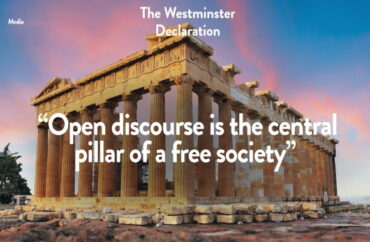
A politically diverse group of 138 public figures recently signed and published the Westminster Declaration, a statement aimed at advancing a global free speech movement.
Among the signatories are prominent scholars such as psychologists Jordan Peterson and Steven Pinker, biologists Richard Dawkins and Bret Weinstein, economist Jeffrey Sachs, linguist John McWhorter, and medical professors Martin Kulldorf and Jay Bhattacharya.
The scholars have faced cancel culture campaigns for voicing narratives that go against popular progressive opinions on campuses on topics such as intellectual diversity, race and COVID-19.
The declaration is also signed by prominent journalists who have been censored or canceled, such as Bari Weiss, Glenn Greenwald and Matt Taibbi.
“We recognize that words can sometimes cause offense, but we reject the idea that hurt feelings and discomfort, even if acute, are grounds for censorship,” it states. “Open discourse is the central pillar of a free society, and is essential for holding governments accountable, empowering vulnerable groups, and reducing the risk of tyranny.”
Freedom of speech “is a vital ‘first liberty’ from which all other liberties follow,” the declaration states. “It is only through free speech that we can denounce violations of our rights and fight for new freedoms.”
The signatories denounce governments, social media companies, and universities all over the world for “increasingly working to monitor citizens and rob them of their voices.”
One of the signatories, Swansea University law Professor Andrew Tettenborn, told The College Fix that censorship in academia comes in various forms.
Some academics who express unpopular views are fired, made unwelcome, or prevented from lecturing, while others see their research papers turned down or promotions held back for political reasons.
“[The latter] don’t tend to get publicity, and purportedly academic justifications are given,” Tettenborn said via email.
When it comes to direct governmental involvement in censorship, the declaration cites Ireland’s Hate Speech Bill, Scotland’s Hate Crime Act, the United Kingdom’s Online Safety Bill, and Australia’s Misinformation Bill.
The declaration accuses Indian and Turkish governments of controlling political content on social media, and German and Brazilian governments of criminalizing political speech.
Social media companies, on the other hand, engage in more subtle methods of censorship, such as “visibility filtering, labelling, and manipulation of search engine results.”
With the help of the so-called “disinformation experts” and “fact-checkers,” social media companies have flagged and even deplatformed citizens voicing uncommon opinions.
The European Union’s Digital Services Act is poised to hand over digital user data to researchers in academia and non-governmental organizations, thereby “relegating our speech rights to the discretion of these unelected and unaccountable entities.”
The signatories conclude their statement by noting that power abused by governments “have historically posed a far greater threat than the words of lone individuals or even [organized] groups.”
“Censorship robs us of the richness of life itself,” the declaration adds. “Free speech is the foundation for creating a life of meaning and a thriving humanity – through art, poetry, drama, story, philosophy, song, and more.”
MORE: More than 1,600 scientists and other scholars sign ‘No Climate Emergency’ declaration
IMAGE: Westminster Declaration





Please join the conversation about our stories on Facebook, Twitter, Instagram, Reddit, MeWe, Rumble, Gab, Minds and Gettr.